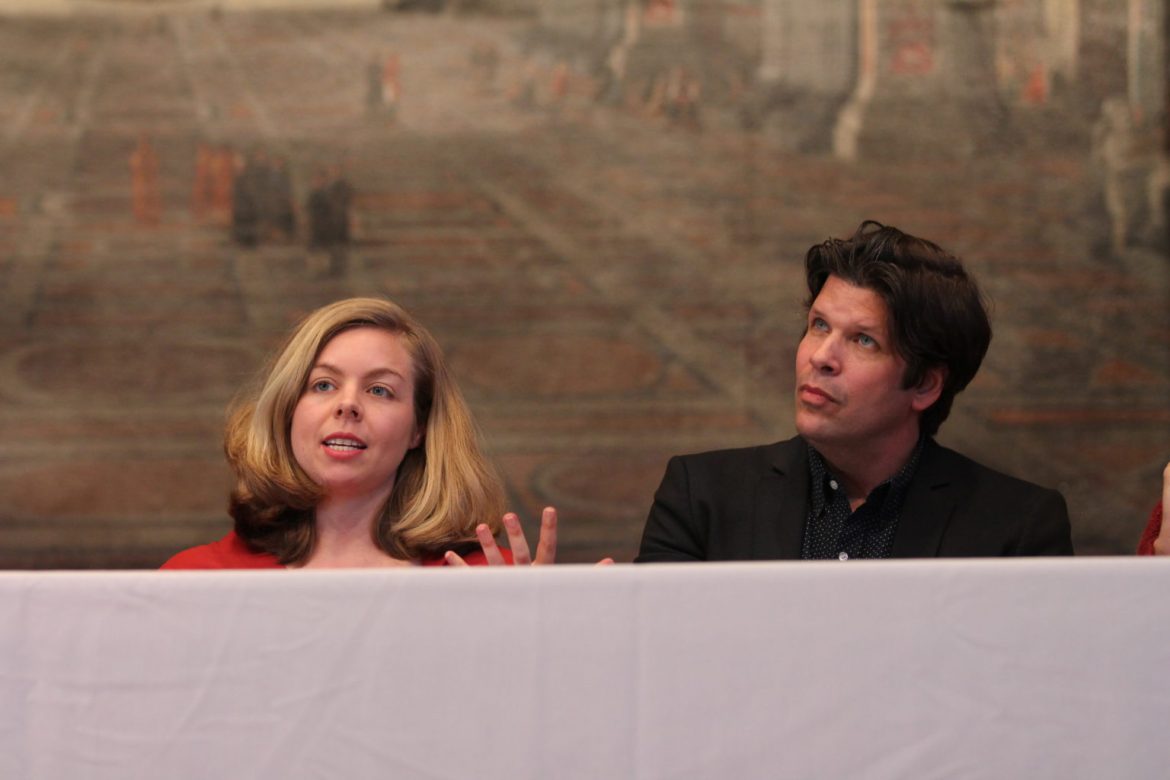Flagpole editor and publisher Pete McCommons, The Bitter Southerner editor-in-chief Chuck Reece, Oxford American editor Eliza Borné, University of Georgia journalism professor Valerie Boyd, New York Times Atlanta bureau chief Richard Fausset and Scalawag managing editor Alysia Nicole Harris sit in on a panel at the UGA Chapel on Feb. 22. The discussion was facilitated by Grady College Dean Charles Davis. “All these people are well known to us, and we work in a variety of different ways with most of these publications, so it was sort of a homecoming of sorts,” Davis said. Photo by Owen Donnelly
On Feb. 22, a panel of six experts in the journalism field engaged in a moderated discussion about Southern journalism at the University of Georgia Chapel.
On Feb. 22, the University of Georgia Willson Center for Humanities and Arts hosted a discussion between a panel of six journalists at the UGA Chapel, moderated by Grady College Dean Charles Davis.
The panel included Flagpole editor and publisher Pete McCommons, The Bitter Southerner editor-in-chief Chuck Reece, Oxford American editor Eliza Borné, UGA journalism professor Valerie Boyd, New York Times Atlanta bureau chief Richard Fausset and Scalawag managing editor Alysia Nicole Harris, all offering a unique perspective on the field of journalism, specifically in the Southern United States.
“It was aimed at readers,” Davis said. “The people who would be interested in coming to this are the people who are interested in the culture of the south and journalism, so I think I think it was a broad cross-section.”
According to Davis, this is the first discussion of this nature the Willson Center has held.
“Nicholas Allen, the director of the Willson Center, approached me last year, suggesting that we have a conversation about the state of Southern journalism,” Davis said. “I have no doubt (we’ll have this again in future years). This is such a rich topic.”
For Boyd, bringing diversity and inclusion to the forefront of the discussion is vital.
“I think it’s important to have this kind of conversation with a diversity of voices at the table, so that we can prepare the next generation of journalists (to lead) a really diverse and inclusive media that upholds the standards to which this country should be accountable,” Boyd said.
Oglethorpe Avenue Elementary School media specialist and CCHS parent Deirdre Sugiuchi attended the event, and was pleased with the subject matters the conversation touched on.
“I did really enjoy listening to (Boyd) and the other (panelists) talk about the need for diversity, inclusion in the South — and in publishing — because for so long, it’s been very whitewashed and I really enjoy that women were (brought) into the conversation,” Sugiuchi said.
Though Davis believes the conversation was productive, the time limit was a hindering aspect.
“When you have six panelists and everybody talks for five minutes, that’s a half-hour,” Davis said. “I always wish we would have had more time.”
For Harris, the conversation of journalism in the South is an important and nationally relevant one.
“(There’s an) actual benefit from looking more closely at regional publications that can tell the stories here well, because if the South can get it right, I really believe that we can really grapple with this history,” Harris said. “That could really inform a lot of the national conversation in ways that we still are not talking about issues of race and class, and if it comes to the American South you’d be blind not to talk about (those things).”
